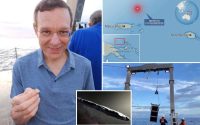Lava flows from Mayon Volcano in the Philippines as thousands flee to safety
LEGAZPI CITY, Philippines – Thousands of people have evacuated regions surrounding the Mayon Volcano in the Philippines as the mountain continues to spew lava and show increasing signs of unrest.
According to the Smithsonian’s Global Volcanism Program, the Mayon Volcano, located near Legazpi City in the province of Albay, is the most active volcano in the Philippines.
An increase in the volcano’s activity led to officials raising the alert level to Alert Level 3 (Increased Tendency Towards Hazardous Eruption) on June 8.
Since then, numerous earthquakes have been reported at the volcano.
Scientists have also noted a sharp increase in rockfall events and pyroclastic flows from the volcano’s lava dome, according to the Philippines Institute of Volcanology and Seismology (PHIVOLCS).
A lava dome is a mound-shaped feature inside the crater or mouth of a volcano, according to the US Geological Survey (USGS).
Lava domes form when magma builds up inside a volcano and pushes up on the crater floor, which sends debris down the volcano’s slopes in the form of rockfall.


On Thursday, the PHIVOLCS reported at least 21 earthquakes over the past 24 hours, as well as at least 260 rockfall events and three pyroclastic density current events, or pyroclastic flows.
In an update, the PHIVOLCS said current hazards include rockfalls, landslides or avalanches, ballistic fragments, lava and pyroclastic flows, moderate-sized explosions and lahars.
A nearly 4-mile radius around the volcano had been declared a Permanent Danger Zone (PDZ), forcing thousands of people to flee their homes, and airspace has been restricted across the region.



Mayon is stirring days before the 32nd anniversary of the eruption of Mount Pinatubo in the northern Philippines.
According to the USGS, the June 15, 1991, eruption of Pinatubo was the second-largest volcanic eruption of the 20th century.


